Accelerate > Publications
Search this online library featuring the latest FAO publications, issue papers and briefs which offer up-to-date knowledge and innovative insights for SDG acceleration.
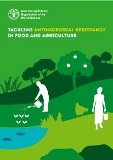
Tackling antimicrobial resistance in food and agriculture
2024
The Food and Agriculture Organization of the United Nations (FAO) leads the global response to antimicrobial resistance (AMR) in the food and agriculture sectors. Its work in response to the many challenges of AMR is currently guided by the FAO Action Plan on Antimicrobial Resistance 2021–2025. This first report on FAO’s contribution to the global response to AMR outlines a wide range of activities undertaken by FAO at global, regional and country level.
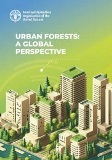
Urban forests: a global perspective
2023
Urban forestry is not a one-size-fits-all solution; each city and region, with its own unique set of challenges and opportunities, requires tailored strategies. In recognition of the diversity and distinctiveness of urban forestry issues and their potential for mitigating environmental and socioeconomic inequality across the globe, FAO has asked experts around the world to share their views on how urban forests and trees are perceived and managed in their respective geographical areas,...
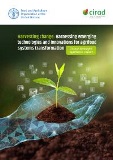
Harvesting change: Harnessing emerging technologies and innovations for agrifood system transformation
2023
The study assesses a selection of technologies and innovations, which potentially could be of paramount importance in addressing agrifood challenges until 2050, as well as the most important trends and drivers that will influence the emergence of agrifood technologies and innovations and their triggers of change, including some regional aspects. The goal is also to build plausible future scenarios for the evolvement of the emerging technologies and innovations in the future with the time...
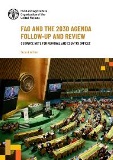
FAO and the 2030 Agenda Follow-up and Review: Guidance Note for Regional and Country Offices
2023
The Guidance Note describes the process of the preparation of the VNRs and what FAO Regional and Country Offices need to be aware and mindful of when providing support to the national partners. It covers information about the importance of the follow-up and review process for the 2030 Agenda and the SDGs, including information about the gaps in the coverage of the Voluntary National Reviews, and recommendations on strengthening VNRs to be meaningful instruments for the acceleration of the SDGs.
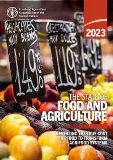
The State of Food and Agriculture 2023 - Revealing the true cost of food to transform agrifood systems
2023
The State of Food and Agriculture 2023 looks into the true cost of food for sustainable agrifood systems. The report introduces the concept of hidden environmental, health and social costs and benefits of agrifood systems and proposes an approach – true cost accounting (TCA) – to assess them.
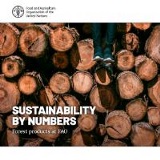
Sustainability by numbers - Forest products at FAO
2023
Over more than three-quarters of a century, FAO’s work on forest product statistics has made the Organization the recognized authority for data fundamental to what we now call the global bioeconomy. Forest product data are essential in monitoring impact and innovation in the global wood industry; responding to climate change by calculating carbon emissions; and developing equitable policies that uphold ecosystem services and forest values for our communities.
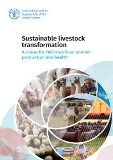
Sustainable livestock transformation. A vision for FAO’s work on animal production and health
2023
Within the framework of the United Nations 2030 Agenda for Sustainable Development, FAO assists Member Nations to improve sound policies, increase investments and develop good practices in the livestock sector.
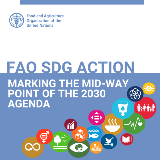
FAO SDG Action: Marking the mid-way point of the 2030 Agenda
2023
As we stand at the midpoint of the 2030 Agenda, it is both a moment of reflection and an opportunity to renew our commitment to achieving the SDGs. In August 2023, the FAO Office of SDGs launched a survey, receiving over 600 responses that shared valuable insights, experiences and actions taken by FAO offices towards the achievement of the SDGs. In addition this survey, FAO project data was leveraged to present this visual representation of FAO’s contribution to the 2030 Agenda implementation.
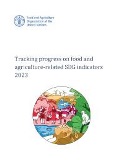
Tracking progress on food and agriculture-related SDG indicators 2023
2023
At the mid-point of the Agenda 2030 for Sustainable Development, there is an urgent need to understand where the world stands in eliminating hunger and food insecurity, as well as in ensuring sustainable agriculture. The new report of the Food and Agriculture Organization of the United Nations (FAO),offers analysis and trends on indicators across eight Sustainable Development Goals (SDGs) – in particular, SDGs 1, 2, 5, 6, 10, 12, 14 and 15.
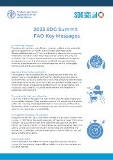
2023 SDG Summit: FAO Key Messages
2023
The 2023 SDG Summit will serve as a pivotal event towards achieving the SDGs, as gathered Heads of State and Government are to carry out a comprehensive review of progress, respond to the impact of multiple crises, and provide high-level political guidance on transformative and accelerated actions for achieving the 2030 Agenda. FAO has developed these key messages to inform the discussions in the lead up to and during this Summit and the Political Declaration which will result from them.
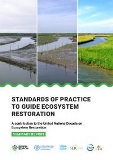
Standards of practice to guide ecosystem restoration: A contribution to the United Nations Decade on Ecosystem Restoration
2023
The United Nations Decade on Ecosystem Restoration 2021–2030 (hereafter “UN Decade”) recognizes the critical need to prevent, halt and reverse the degradation of the world’s ecosystems. Effective restoration of degraded ecosystems is of paramount importance for recovering biodiversity, ecosystem health and integrity, ecosystem goods and services, climate-change mitigation and human health and well-being.
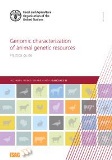
Genomic characterization of animal genetic resources - Practical guide
2023
Molecular biotechnologies have developed rapidly and substantially since the release of these previous guidelines. The livestock sector has been an active participant in the so-called “genomic revolution.” Advancements in the sequencing of genomes and related genotyping methods have created opportunities for gathering much more information on the molecular level than ever possible, at a faster rate, and for exponentially decreased costs.
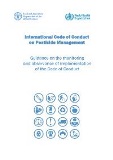
International Code of Conduct on Pesticide Management - Guidance on the monitoring and observance of implementation of the Code of Conduct
2023
The objective of this guidance on fulfilling the reporting requirements of Article 12 of the Code of Conduct is to obtain a regular flow of information on its observance to strengthen implementation of the Code, to provide data for its future revisions and improvement, and, most importantly, to improve the protection of human health and the environment related to pesticide use and management in agriculture and public health.
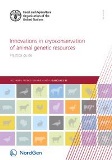
Innovations in cryoconservation of animal genetic resources - Practical guide
2023
The livestock sector faces a range of challenges, including climate change, emerging diseases, competition for natural resources and evolving demand for animal-source foods, which is increasing globally, especially in developing countries. Genetic diversity of livestock is a key resource for allowing livestock keepers to address these challenges, but this diversity has been in a state of decline...
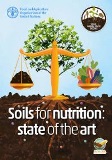
Soils for nutrition: state of the art
2022
This booklet contributes to understanding processes related to soil fertility from the perspectives of food production and food security, and the environmental and climate change impacts associated with fertilizer misuse and overuse. The booklet also outlines the main areas of opportunity and the way forward to solve the nutrient imbalance prevailing in our current agrifood systems.
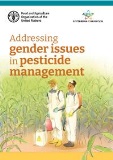
Addressing gender issues in pesticide management
2022
The Rotterdam Convention Secretariat (NSPRD) and the Gender team in ESP developed this publication with the objective of highlighting the gender-related implication of pesticide use and management, focusing on the role of women in handling hazardous pesticides in agriculture, the reasons why they are at higher risk and the health-related implications they face. The brochure provides an overview of how FAO addresses the topic ...

A rapid review of effective financing for policy, implementation and partnerships addressing drought risks
2022
The report presents an overview of current knowledge and thinking concerning the effectiveness of three distinct layers of financing that set out to address drought risks in different ways. For each of these, results are conceptualized and measured in different ways for disaster risk reduction, adaptation to climate change, and transformative green finance.
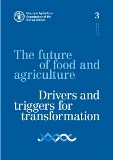
The future of food and agriculture – Drivers and triggers for transformation
2022
This report aims at inspiring strategic thinking and actions to transform agrifood systems towards a sustainable, resilient and inclusive future, by building on both previous reports in the same series as well as on a comprehensive corporate strategic foresight exercise that also nurtured FAO Strategic Framework 2022–31. It analyses major drivers of agrifood systems and explores how their trends could determine alternative futures of agrifood, socioeconomic and environmental systems.
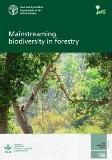
Mainstreaming biodiversity in forestry
2022
This study is a collaboration between FAO and the Center for International Forestry Research (CIFOR), lead centre of the CGIAR research programme on Forests, Trees and Agroforestry (FTA). Illustrated by eight country case-studies, the report reviews progress and outlines the technical and policy tools available for countries and stakeholders, as well as the steps needed, to effectively mainstream biodiversity in forestry.
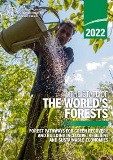
The State of the World’s Forests 2022 - Forest pathways for green recovery and building inclusive, resilient and sustainable economies
2022
Against the backdrop of the Glasgow Leaders’ Declaration on Forests and Land Use and the pledge of 140 countries to eliminate forest loss by 2030 and to support restoration and sustainable forestry, the 2022 edition of The State of the World’s Forests (SOFO) explores the potential of three forest pathways for achieving green recovery and tackling multidimensional planetary crises, including climate change and biodiversity loss...
Browse by SDG
- SDG1: No Poverty
- SDG2: Zero Hunger
- SDG3: Good Health & Well-being
- SDG4: Quality Education
- SDG5: Gender Equality
- SDG6: Clean Water & Sanitation
- SDG7: Affordable and Clean Energy
- SDG8: Decent Work and Economic Growth
- SDG9: Industry, Innovation and Infrastructure
- SDG10: Reduced Inequalities
- SDG11: Sustainable Cities and Communities
- SDG12: Responsible Consumption and Production
- SDG13: Climate Action
- SDG14: Life Below Water
- SDG15: Life on Land
- SDG16: Peace, Justice and Strong Institutions
- SDG17: Partnerships for the Goals
Browse by Better
Browse by Priority Area
- Innovation for Sustainable Agriculture Production
- Blue Transformation
- One Health
- Small-Scale Producers' Equitable Access to Resources
- Digital Agriculture
- Healthy Diets for All
- Nutrition for the Most Vulnerable
- Safe Food for Everyone
- Reducing Food Loss and Waste
- Transparent Markets and Trade
- Climate Change Mitigating and Adapted Agrifood Systems
- Bioeconomy for Sustainable Food and Agriculture
- Biodiversity and Ecosystem Services for Food and Agriculture
- Achieving Sustainable Urban Food Systems
- Gender Equality and Rural Women's Empowerment
- Inclusive Rural Transformation
- Agriculture and Food Emergencies
- Resilient Agrifood Systems
- Hand-in-Hand Initiative
- Scaling up Investment
